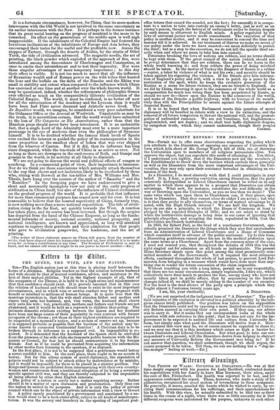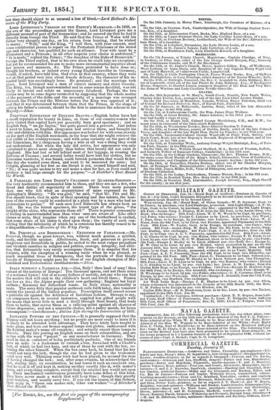Ittrratti Cramp.
THE Parsion OP WALES : Courarma nv DEPLETION.—He was at that time deeply engaged with his passion for Lady Hertford, contracted during his negotiations with her family to have Miss Seymour, their niece, under the care of Mrs. Fitzherbert. His health was reported to be bad, and his appearance confirmed the report. Those, however, who made a study'of his gallantries, recognized his usual system of lovemaking in these symptoms. He generally, it seems, assailed the hearts which he wished to carry, by ex- citing their commiserations for his sufferings, and their apprehensions for his health. With this view, he actually submitted to be bled two or three times in the course of a night, when there was so little necessity for it that different surgeons were introduced for the purpose, unknown to each other, lest they should object to so unusual a loss of blood.—Lord Holland's Me- moirs of the Whig Party.
LORD LIVERPOOL'S VERSION OF THE PRL'ICE'S MARRIAGE.—In 1820, On the eve of the proceedings against the Queen, Lord Liverpool gave me a different account of part of the transaction ; and he assured me that he had it directly from George the Third. He said that the Prince of Wales told his father very abruptly one day, on his return from hunting, that he wished to marry. "Well,' said the King, "I will then, with your consent, send some confidential person to report on the Protestant Princesses of the stated age and character, but qualified for such an alliance. Your wife must be a Protestant and a Princess ; in all other respects your choice is unfettered." "It is made," replied the Prince; " the daughter of the Duke of Brunswick." George the Third replied, that to his own niece he could take no exception ; but yet he recommended his son to make more circumstantial inquiries about her person and manners, &c. The Prince pretended to have done so; though his brothers, or indeed every young English traveller in Germany, would, if asked, have told him, that even in that country, where they were not at that period very nice about female delicacy, the character of his in- tended bride was exceedingly loose. He persisted; and the marriage took place. Lord Liverpool was a man of correct memory and strict veracity. The King, too, though narrowminded and in some senses deceitful, was not likely to invent and relate an unnecessary falsehood. Perhaps the two stories may be in some degree reconciled by supposing that the whole matter of the payment of the debts and the necessity of a marriage was arranged between the Prince and the Minister before the King was apprized of it ; and that it was determined between them that the Prince, in the shape of asking his father's consent, should be the first to announce the scheme to his Majesty.-1dens.
PERUVIAN EsTnitATiox or ENGLISH BEAUTY.—English ladies have but a small reputation for beauty in Lima, as those of our countrywomen who have visited that capital have not generally been good specimens ; and an English foot, " un pie Ingles," has quite passed into a proverb. Just before I went to Lima, an English clergyman had arrived there, and brought his wife and children with him. Her appearance was looked for with some anxiety on the part of the English merchants, in the hope that she might retrieve the lost credit of her countrywomen ; and with some curiosity on the part of the fair Limenians, for a clergyman having a wife at all was a thing they could not understand. But when the lady did arrive, her appearance was only calculated to prove more strongly than before that beauty did not exist in England. She had lost or left behind most of her luggage, in crossing the Isthmus of Panama ; and several ladies would have lent her clothes, but no Limenian wardrobe, it was found, could furnish garments that would fit her. One day she wanted some shoes, and went to be measured for some; but Crispin, glancing at her foot as she thrust it out, crossed himself and said, "No ; it was quite useless to try and make a shoe for her, as Peru could not produce a last large enough for the purpose."—A Sketcher s Tour .Round the World.
A PARALLEL FOR LORD DERBY'S CHAIRMEN OF QUARTER-SESSIONS.— Big very mediocrity recommended him to those, and they are not a few, who dread and dislike all superiority of talent. There were more persons than one who felt what an acquaintance of mine expressed on Mr. Addington's Ministry. "He was glad," he said, "that Mr. Pitt and Mr. Fox should know, that in spite of their speaking and fine talents, the busi- ness of the country could be conducted in a plain way by a man who had no pretensions to genius." Of such men Lord Sidmouth has always been an idol. He was the fairest specimen, the truest type of the genus, "the knight of the shire, who represents them all." There is greater community of feeling in narrowminded men than wiser ones are aware of. Like other classes or sects, they imagine when any one of the brotherhood is exalted, that some share of his lustre is shed upon them; the vanity of each con- ceiving that the inferiority of which be is conscious has thereby ceased to be a disqualification.—Menioirs of the Whig Party.
MR. PERCEVAL AND ROBESPIERRE : EXTREMES OF FANATICISM.—Mr. Perceval, though no great lawyer, was, without much genius, a spirited, ready, and forcible speaker. Affectionate, frank, and generous in private, dangerous and formidable in public, ho united to the most vulgar prejudices and virulent enmities in religion and polities, courage, integrity, and abili- ties, that fortunately very rarely accompany them. It is singular that his features, with the exception of a winning smile when he was pleased, so much resembled those of Robespierre, that the portraits of that bloody fanatic of Democracy might pass for those of our English champion of Mo- narchical and Ecclesiastical establishments.—Idein.
ITALY 'WITHOUT A NATIONAL Airt.—Alas, Italy! thou land of song ! thou outcast of the nations of Europe! Ten thousand operas, and not three notes of a national hymn ! Out of so many fathers of melody' not one who can find the motive that will sink to thy children's heart and dwell there ; France has her ca ira; the Alpine people their cow-gathering ; England her loyal anthem ; Germany her fatherland toasts. In Italy alone, nationality is mute. The sorry ditty that popular outbreak calls forth today, dies tomorow amidst the yawns of thy listless populace. Proscription itself cannot secure a patriotic air against the fickleness of fastidious fashion. Strange to say, our composers have, in several instances, supplied less gifted people with the music that never fails to send a thrill through their hearts, that leads them to battle, that serves them as a rallying-point against all chances of future dispersion ; and not a miserable chorus, not a paltry march, for home consumption !—Casullanionte; Italian Life during the Insurrection of 1831.
IxITATIVE POWERS OF THE CHINESE.—It is generally supposed that the Chinese will not learn anything : but no people are more ready to learn if it is likely to be attended with advantage. They have lately been taught to Make glass, and turn out bronze argand lamps and globes, emblazoned with the London maker's name all complete ; and actually export these lamps to Batavia. They like putting an English name on their commodities, and are as free with the word "patent" as any manufacturer in Germany. They excel in the in :nufacture of locks, particularly padlocks. One of my friends gave an order to a tradesman to varnish a box, furnished with a Chubb's lock, of which he had two keys, and one of these he sent with the box, re- taining the other himself. When the box came back, he found that his key Would not turn the lock, though the one he had given to the tradesman acted very well. Thinking some trick had been played, he accused the man of having changed the lock; and, after some evasion, he acknowledged the fact, stating that, on examination, he had found it such an excellent one, that he took it off and kept it, making another exactly like it, with maker's name, and everything complete, except that the original key would not open it. Their mechanical contrivances generally have some defect of this kind. They have never made a watch that will keep time ; though they greatly Prize watches, and usually carry two. If you ask the reason of this fashion, their reply is, " Spose one melee sick, other can walkee."—A Sketcher's Tour Round the World.



































 Previous page
Previous page